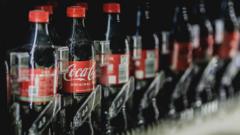In the wake of tariffs imposed by President Trump, Coca-Cola may shift to greater use of plastic bottles for its beverages. During a recent investor call, CEO James Quincey stated that if the costs of aluminum cans rise significantly, the corporation would have to adapt by emphasizing plastic packaging options. The tariffs, which have increased the import tax on aluminum by 25%, are set to affect the entire industry, potentially making canned goods more expensive.
Previously, Coca-Cola had committed to sustainability targets aimed at using 50% recycled materials in their packaging by 2030. However, these goals have since been scaled back to a range of 35% to 40% by 2035, reflecting the pressures of increasing costs. Quincey noted that while packaging does represent a relatively small portion of Coca-Cola's overall expenses, decisions will need to be made to maintain competitive pricing.
Over recent years, Coca-Cola has been promoting its beverages in aluminum cans, aligning with greater environmental responsibility and marketing strategies. Nonetheless, the shift back to plastic is concerning for environmental advocates, as Coca-Cola has been labeled the "top global plastic polluter” for six consecutive years.
The U.S. is notably reliant on imports for nearly half of its aluminum, according to the United States Geological Survey. Therefore, any increase in tariffs is likely to elevate prices across the board. Unlike previous years where can manufacturers could seek exemptions, President Trump has vowed that this time there will be no exceptions, complicating future operational plans.
Additionally, the recent discontinuation of a government initiative to replace plastic straws with paper ones by Trump further exacerbates potential for plastic pollution, contrasting with initiatives previously put forth by former President Joe Biden, who labeled plastic pollution a crisis.
Previously, Coca-Cola had committed to sustainability targets aimed at using 50% recycled materials in their packaging by 2030. However, these goals have since been scaled back to a range of 35% to 40% by 2035, reflecting the pressures of increasing costs. Quincey noted that while packaging does represent a relatively small portion of Coca-Cola's overall expenses, decisions will need to be made to maintain competitive pricing.
Over recent years, Coca-Cola has been promoting its beverages in aluminum cans, aligning with greater environmental responsibility and marketing strategies. Nonetheless, the shift back to plastic is concerning for environmental advocates, as Coca-Cola has been labeled the "top global plastic polluter” for six consecutive years.
The U.S. is notably reliant on imports for nearly half of its aluminum, according to the United States Geological Survey. Therefore, any increase in tariffs is likely to elevate prices across the board. Unlike previous years where can manufacturers could seek exemptions, President Trump has vowed that this time there will be no exceptions, complicating future operational plans.
Additionally, the recent discontinuation of a government initiative to replace plastic straws with paper ones by Trump further exacerbates potential for plastic pollution, contrasting with initiatives previously put forth by former President Joe Biden, who labeled plastic pollution a crisis.




















